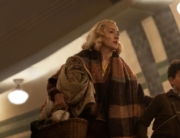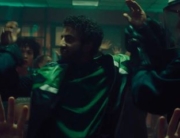Modernizing Shakespeare is a time-honored tradition, but it often seems more
generic than genuine. The reason that Shakespeare’s plays remain popular is because of their relevancy despite the 400 years separating their origins from today. So for Ralph Fiennes to take Coriolanus—about a disgraced Roman general who joins the enemy against his country—from its ancient setting to the war-ravaged present is an unfortunate reaction against the complexity of the language and the obscurity of the plot and setting to contemporary audiences.
Shakespeare’s Gaius Martius, a military man through and through, is a Roman general with little thought—and even less use—for the ordinary people. His first appearance in the play, during a confrontation with rioting Roman citizens who want food from nearby stores of grain, shows his naked contempt for those not his comrades in arms. When he later returns to Rome a hero after successfully fending off the advance of the hated Volscian army, he’s talked into running for the office of consul by his controlling mother, Volumnia, and the friendly senator Menenius, who has bestowed on him the honored title of “Coriolanus.”
But Coriolanus is no politician. He is unable to fake compassion for the citizenry, and when he is again confronted by (to his ears) insolent rabble-rousers from the public and the senate, he loses his temper and calls them out, bemoaning that it’s allowed for “crows to peck the eagles.” Needless to say, popular support turns against him and he is banished. In a rage, he offers himself to the Volscians, with whom he joins to attack Rome and gain his revenge.
In Fiennes’ film, ancient Rome has become an unnamed contemporary nation. The atrocities of the Bosnian war are recalled in this production that was shot in Serbia. It’s no earth-shattering revelation that a play written four centuries ago about a general who lived two thousand years earlier is relevant to our tenuous times: history—and art—repeats itself. But trying to make every aspect of Coriolanus recognizable, if not meaningful, to those who would never be caught dead watching, attending, or reading Shakespeare, forces Fiennes into a dramatic and thematic corner.
As director, Fiennes makes expressive use of Serbian locations, which still bear scars of the murderous warring among political and religious factions. But the use of modern technology—around-the-clock TV news networks show the ongoing battles and help explain who’s who and what’s what for a presumably unfamiliar audience—undercuts Shakespeare’s dialogue, notably when Volumnia and Virgilia, Coriolanus’s faithful wife, wait desperately for news of him. All they need to do is turn on the TV, instead of waiting to hear from Menenius for news. And when Volumnia later tells Menenius that Coriolanus was wounded but recovering, why wouldn’t he already have known that through the 24/7 news cycle?
Fiennes helms gritty battle sequences in the shaky hand-held style of Full Metal Jacket and Saving Private Ryan, apparently to appease those who might wander in hoping for gory combat. When Coriolanus searches door to door for hidden enemies (would a general, no matter how reckless, do such a thing alone?) and vanquishes a surprise attacker, his shiny bald head becomes caked in blood, a visceral image that substitutes Shakespeare’s complexity for mere black and white.
But the ultimate clash between Fiennes’ and screenwriter John Logan’s modern sensibility and Shakespeare is the mano-a-mano fight between Coriolanus and the Volscian leader, Aufidius. Both armies are equipped with automatic weapons, but when these two men begin their brawl, they put down the modern weaponry and unsheathe glistening knives before joining the battle. In another nod to mindless movie violence, they crash through a plate glass window and fall two stories into a dumpster: unbloodied and unbowed (and with no broken bones, apparently), they must be physically separated by their allies.
Brian Cox (Menenius), Gerard Butler (Aufidius) and Jessica Chastain (Virgilia) make solid contributions, while Vanessa Redgrave takes the scenery-chewing role of Volumnia and turns it into a tour de force more powerful because of her restraint. Fiennes’ Coriolanus, an equally strong screen presence, is able to make us sympathetic toward this fatally prideful man, effortlessly making Shakespeare’s words sound conversational even when he’s confrontational. His spiteful pronunciation of “boy,” spat out at the Volscians, leads to a tremendously emotional climax.
But it’s too bad that Fiennes didn’t trust Shakespeare more often. His concerns are still ours,
but making them obvious doesn’t make them any clearer.






Leave A Comment